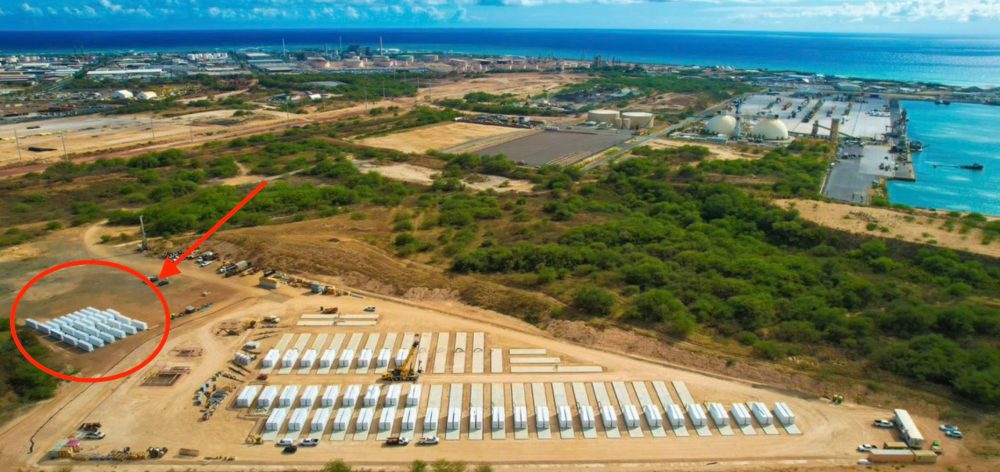Tesla Megapacks arrive in Hawaii with the state’s last coal shipment as it shifts its grid to renewables supported by energy storage enabled by batteries like the Megapacks.
In the transition to a sustainable energy economy, we take every small victory we can get and this one is significant.
Hawaii aims to reach 100% green energy by 2045 and already has the highest amount of solar capacity deployed per capita. However, in order to handle all that renewable energy, the state needs to balance it with energy storage capacity since the sun doesn’t always shine.
Tesla has been deploying batteries in Hawaii for years in order to help toward that goal. The company works with Hawaiian Electric on giant new battery systems and on a virtual power plant using Powerwalls.
Earlier this year, we reported that Tesla is deploying Megapacks at a new energy storage project that will replace Hawaii’s last remaining coal plant.
Today, Tesla CEO Elon Musk reported that some Megapacks for the projects were delivered at the same time as Hawaii received its last coal shipment:
The port where the coal shipment came is located right next to the Kapolei Energy Storage facility (KES).
You can see on the image shared by Musk that more recently delivered Megapacks are sitting waiting to be installed:

Once completed, the Kapolei Energy Storage facility (KES) will become one of the largest battery systems in the world with a capacity of 185 megawatts/565 megawatt-hours. It is a project in partnership with Plus Power and Hawaiian Electric – the former decided to use Tesla Megapacks to power the system.
In total, it is expected to have 158 Megapacks.
When we last reported on the project in June, it was supposed to be operational by September 2022 when Hawaii’s last remaining coal plant, which is located just down the road from KES, is expected to be retired.
The coal power plant is used to maintain grid frequency – something Tesla’s energy storage products have proven capable of doing – and that’s what KES is aiming to do along with absorbing excess solar power during the day and discharging during the evening.
Now it looks like Tesla and its partners have some pressure to finish the project in time since the coal plant is apparently going to start burning its last shipment of coal.
Subscribe to Electrek on YouTube for exclusive videos and subscribe to the podcast.

lasuna canada – himcolin pills cost himcolin
purchase besivance without prescription – besivance buy online sildamax pill
neurontin sale – motrin us sulfasalazine 500mg pill
probenecid 500mg drug – purchase benemid pills oral carbamazepine 400mg
purchase mebeverine without prescription – buy mebeverine buy cheap cilostazol
buy voltaren 100mg generic – how to buy aspirin aspirin price
pyridostigmine over the counter – mestinon order online imuran 50mg without prescription
purchase voveran generic – buy imdur pills for sale cheap nimotop online
lioresal oral – feldene online order buy feldene pills
meloxicam cheap – order maxalt 5mg without prescription buy ketorolac online cheap
generic cyproheptadine – buy generic tizanidine tizanidine pills
trihexyphenidyl for sale online – order artane generic buy voltaren gel online cheap
buy omnicef pill – buy cefdinir generic cheap cleocin
buy accutane 20mg online – deltasone 10mg pill buy deltasone 40mg
prednisone 5mg generic – prednisone 40mg over the counter order elimite online
brand permethrin – buy generic tretinoin for sale order retin cream online cheap
purchase betamethasone sale – benoquin order online benoquin oral
brand metronidazole – brand metronidazole 400mg purchase cenforce pills
augmentin tablet – levothyroxine pills order synthroid 75mcg without prescription
order cleocin 150mg online cheap – buy indocin 75mg for sale buy indomethacin cheap
how to get losartan without a prescription – keflex tablet order keflex 125mg generic
eurax where to buy – buy aczone gel for sale aczone usa
provigil 100mg pills – meloset 3 mg over the counter meloset sale
buy zyban without a prescription – cheap shuddha guggulu without prescription cheap shuddha guggulu without prescription
purchase capecitabine generic – xeloda for sale purchase danocrine
purchase progesterone online cheap – cheap fertomid generic order clomiphene for sale
estradiol price – buy cheap letrozole purchase arimidex generic
buy cabergoline online cheap – buy premarin pills buy alesse no prescription
гѓ—гѓ¬гѓ‰гѓ‹гѓі гЃ®иіје…Ґ – гѓ—гѓ¬гѓ‰гѓ‹гѓі и–¬е±ЂгЃ§иІ·гЃ€г‚‹ г‚ёг‚№гѓгѓћгѓѓг‚ЇгЃ®иіје…Ґ
eriacta would – apcalis throat forzest yard
valif online wobbler – buy sinemet sale sinemet 20mg us
provigil 100mg brand – provigil 100mg cost purchase epivir pill
oral stromectol cost – buy tegretol online tegretol 400mg generic
prednisone 5mg canada – prednisone 20mg uk captopril 25mg pill
order accutane 20mg generic – accutane 40mg tablet brand linezolid
cheap generic amoxil – buy ipratropium 100mcg online buy cheap combivent
buy zithromax without a prescription – purchase nebivolol order bystolic 20mg without prescription
buy omnacortil 20mg generic – azithromycin usa buy progesterone paypal
neurontin 800mg tablet – order gabapentin for sale buy cheap sporanox
order furosemide for sale – oral lasix 100mg order betamethasone 20gm creams
buy acticlate generic – order generic ventolin inhalator glipizide 10mg sale
buy clavulanate without prescription – buy ketoconazole tablets cymbalta 20mg over the counter